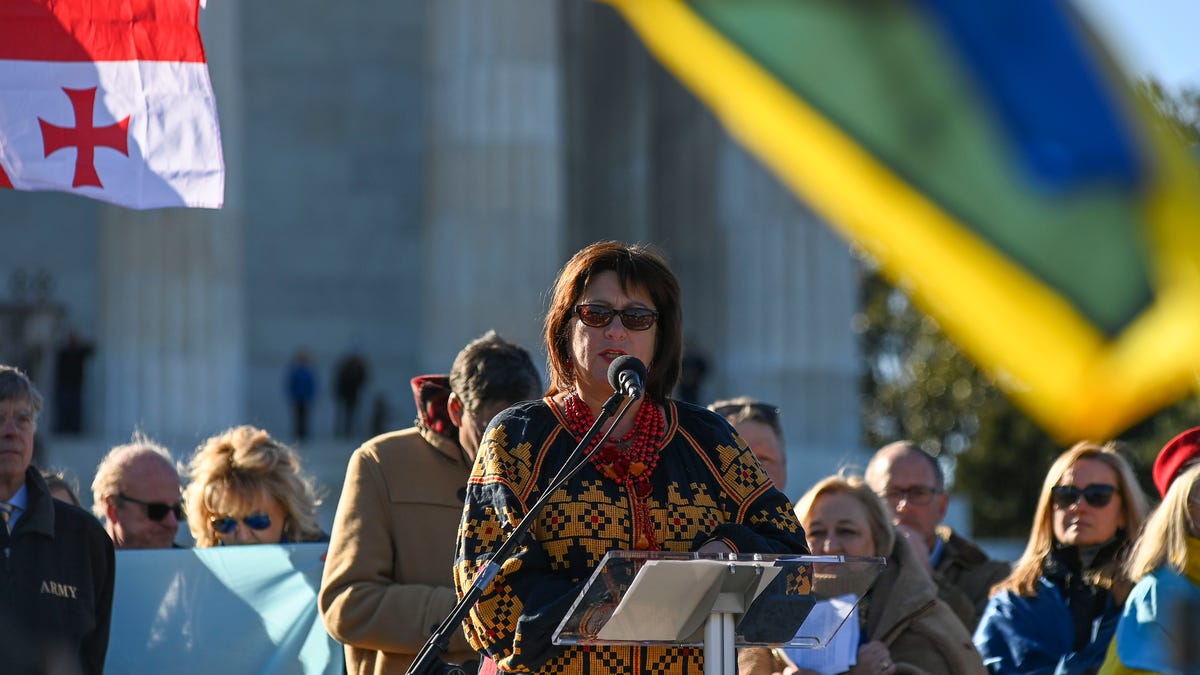Russia Sanctions Are 'Too Little, Too Late,' but Here's What Can Help
Natalie Jaresko, former finance minister of Ukraine, is confident her nation will prevail but says governments and tech companies need to do more.

Natalie Jaresko, former minister of finance of Ukraine, rallies Ukraine supporters in front of the Lincoln Memorial in late February.
Russia's war on Ukraine has met with fierce resistance, flipping the narrative of an overwhelming invading force into one of an army bogged down by heavy losses and aging equipment. It's one reason why Natalie Jaresko is confident that Ukraine will ultimately triumph against Russia, although she warns that both governments and the tech industry aren't doing enough to help.
Jaresko offers a unique perspective. She was born and raised in the suburbs of Chicago to Ukrainian immigrant parents. Her career at the US embassy in Ukraine and as an investment banker for Ukrainian businesses led to her role as finance minister of the country on the heels of its 2014 revolution that left it $40 billion in debt. In her year and a half as finance minister, Jaresko restructured Ukraine's debt and put the country in a position to thrive over the last decade.
All that makes the current situation all the more tragic.
"The Russians are using a scorched-earth approach, and they're bombing everything to smithereens," said Jaresko, speaking via Zoom from San Juan, Puerto Rico. "They're killing civilians indiscriminately."
The conflict has resulted in more than 400 civilian deaths so far, according to the United Nations' human rights organization. More than 2 million refugees have crossed the border in an effort to flee the violence. Russian troops, meanwhile, have captured a major Ukrainian city in Kherson and have nearly surrounded the capital, Kyiv, in an invasion that started on Feb. 24.
And while governments around the world have levied sanctions against Russia, and businesses have cut ties with the country, from Apple ceasing sales of its products there to Visa and Mastercard cutting off their payment networks, Jarseko believes there's more that can be done.
The sanctions are "way too selective, and it's too little, too late," she said. "Time is of the essence."
Governments and Big Tech
She noted that many sanctions go into effect later in March and need to be made effective immediately. Governments need to target all the state banks and energy and commodity companies in Russia, she said. (The US banned oil and gas imports from Russia on Tuesday.)
"The sanctions that have been rolled out I look at as building blocks, and they're an incomplete building," Jarekso said in an earlier interview last week. She also said that the sanctions should apply to neighboring Belarus, which allowed the buildup of Russian troops in its territory and supports the invasion.
Likewise, she advocated sanctioning all individuals in the political elite, from the members of Duma, or the state assembly, to every Russian oligarch in the Forbes' list of wealthiest people in the world.
Jaresko says the sanctions against Russia should take effect faster and be more severe.
"There is still a great deal we could do to put pressure on that economy," she said.
Likewise, technology companies could do more. Jaresko said cloud platforms need to stop servicing their Russian clients and work to isolate the country. From dating apps to marketing platforms to chip companies, all need to cease operating there.
"Just stop. Put an end to it and do not help fuel the economy," she said.
Tech companies have been wary of shutting down their services completely, arguing that cutting out a source of information would mean the Russian people would be solely reliant on state-run propaganda for their news. In the early days of the invasion, Facebook and Twitter focused on tagging propaganda and cracking down on ads but didn't outright ban accounts. Russia has since blocked Facebook.
But Jaresko argues that efforts to inform the Russian people, including Ukrainians changing Google restaurant reviews to share information of the invasion to Russian users, isn't making much of a dent in the perception in Russia and that President Vladimir Putin could shut down the internet at any moment.
Rebuilding Ukraine
When Russia first seized territory in the war in the Donbas region of Ukraine in 2014, Jaresko said, experts at the time estimated about 7% of the territory and 20% of the nation's GDP had been lost, amounting to tens of billions of dollars. She estimates the cost of this war will be in the hundreds of billions of dollars.
If Jaresko believes Ukraine will prevail, how does it rebuild? That's a task complicated by the already 2 million people who have fled the country.
The first thing is to assess the damage, she said. Global financial institutions like the International Monetary Fund and World Bank will have to help. But she believes Russia should be responsible for the majority of reparations and funds to rebuild. She also suggested using the frozen assets of the oligarchs and the Central Bank of Russia.
At some point, there will have to be negotiations with Russia.
"It's hard right now to foresee those kinds of negotiations, given where Putin is and where he stands with regard to the Western world," she said.
CNET's Connie Guglielmo contributed to this report.
Check out the entire conversation with Jaresko, in which we touch upon the role of technology in the conflict, on the Daily Charge podcast.

